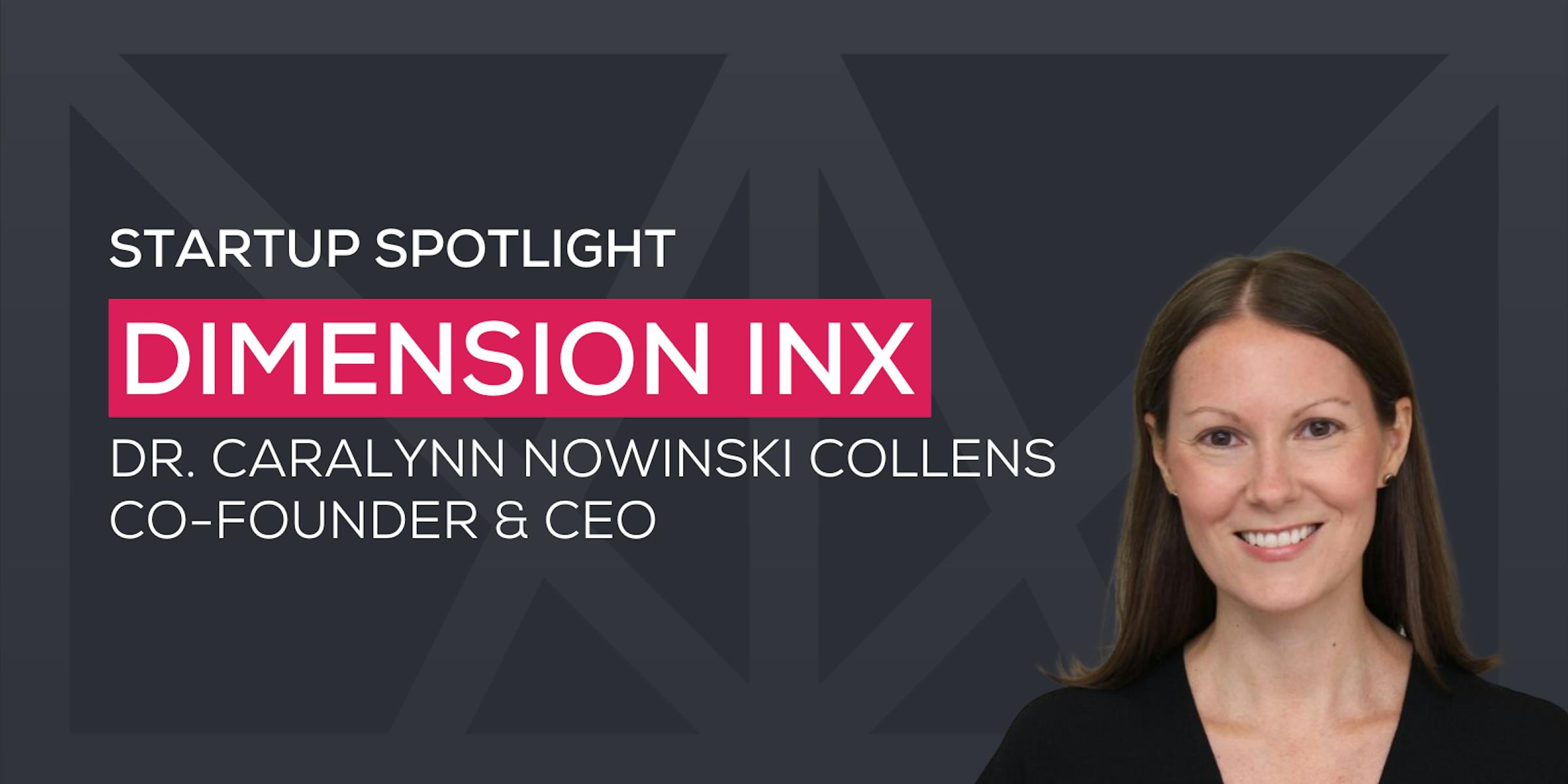MATTER Startup Spotlight: Dimension Inx
Giving the body a blueprint to heal itself
While regenerative medicine offers a promising future for with organ failure, significant hurdles remain. MATTER member Dimension Inx is addressing these challenges by leveraging their platform to create 3D microenvironments that can be implanted to influence cells to act in certain ways.
Dr. Caralynn Collens, co-founder and CEO of Dimension Inx, sat down with MATTER to discuss Dimension Inx’s transformative solution, her entrepreneurial journey and lessons learned along the way.
Responses have been edited for length and clarity.
MATTER: Tell me about the Dimension Inx solution.
Dr. Collens: We play in the regenerative medicine space, meaning we’re rebuilding and restoring function to tissues and organs. Specifically, Dimension Inx is a biomaterials platform that we use to design and develop therapeutic products for overcoming organ failure and restoring lives.
Often, cells alone are not enough to drive tissue regeneration and reestablish functionality in the body. But with the three-dimensional blueprint our materials create, we aim to restore organ function, delaying or even eliminating the need for an organ transplant. Currently, our product pipeline consists of products that address bone regeneration, soft tissue restoration and ovarian dysfunction. We have a key focus on women’s health, developing products that address fertility challenges and hormone replacement.
MATTER: What makes Dimension Inx different from other solutions on the market?
Dr. Collens: With a focus on restoration, we recognize that we don’t need to 3D-print an organ to create healthy organ function — we just need to know what the right factors are and how we can manipulate those factors.
“We don’t need to 3D-print an organ to create healthy organ function — we just need to know what the right factors are and how we can manipulate those factors.”
Generally speaking, when we’re talking about tissue function, we’re talking a lot about cells. And a lot of regenerative medicine today is focused on cells, however, we take more of a material-centric approach. Basically, we assert that cells alone aren’t enough, and we need to provide cells with the right microenvironment — specifically for us, a three-dimensional microenvironment that directs their behavior to take advantage of the cells’ own natural forces.
We simply give the cells a happy place, if you will, to ensure they’re behaving in the right way. That’s a bit different than how some other companies are approaching this. Now there are other companies that are similarly looking at creating the right environment for the cell, but we’re very focused on the proprietary nature of our biomaterials and how we manufacture them into constructs to get the right cell behavior.
MATTER: Can you share the Dimension Inx story?
Dr. Collens: My partners and co-founders, Adam Jakus, chief technology officer, and Ramille Shah, chief scientific officer, are brilliant material scientists and tissue engineers, and they developed the Dimension Inx platform while at Northwestern University in 2010. When Ramille’s lab got their first 3D printer, they realized there weren’t any materials for the printer that were both manufacturable and biofunctional. They, therefore, sought to create a platform that allowed for the balance of biofunctionality and manufacturability, which is what we’re commercializing now at Dimension Inx.
I joined the team as a co-founder at the end of 2019 to help identify how to apply our materials to create therapeutic products. We moved more aggressively into product development around that time, and that’s what we’ve been doing ever since.
MATTER: What milestones have you reached along the way?
Dr. Collens: This is a relatively new approach to this market, so we believe that part of our job is to steer where the market is going and establish proof points for the products that currently exist. We felt that we needed something big and disruptive to create a blockbuster product that uses biomaterials as a core component of its biofunctionality, but we didn’t think that was the right place to start.
“This is a relatively new approach to this market, so we believe that part of our job is to steer where the market is going and establish proof points for the products that currently exist.”
We decided to start with a more fundamental approach to derisking the platform. Our first product is in bone regeneration, specifically for facial reconstruction. We have spent the last three years developing this product and getting it ready for market, and it will be in market next year.
Another important milestone for us, like any startup, is validating product-market fit. In some ways, we do that with the products themselves, but we also have a hybrid business model in which we develop products for our internal pipeline while also developing products in partnership with other companies. We have partnered with a number of companies in the med tech and biotech spaces over the last few years, working on pilot projects and feasibility studies.
Earlier this year, we took those partnerships to the next level and began developing more joint development partnerships, which are longer-term strategic partnerships to develop new products, further validating our business model and confirming that we have a unique approach to solving these types of problems. We are at an interesting stage right now where we are wrapping up what we set out to do in our seed stage and are looking toward our next stage of growth.
MATTER: What is your background?
Dr. Collens: I’m a physician by training, and I started my first company when I was in medical school, basically changing my entire career trajectory. The company was a gene therapy company for oncology that crashed and burned in 2008. I didn’t know what I didn’t know, but it was a great experience and led me to the world of early-stage life sciences companies, which is where I’ve spent most of my career.
In 2011, I joined a group of people who were seeking to develop an advanced innovation center, a place where we could marry university technologies and research with industry problems. We created what is today MxD, the National Digital Manufacturing Institute.
I didn’t know a thing about manufacturing at that time, but I was given this frontline view of all the amazing things happening in advanced manufacturing and grew excited about the potential to use some of these advanced manufacturing tools in life sciences. When I left MxD in 2019, I was looking for that chance to bring medicine and manufacturing together, and that led me to where I am today.
MATTER: How have your previous experiences prepared you for success with Dimension Inx?
Dr. Collens: It gets easier every time you do it — building a company, building a team — these are hard, complex beasts that are like trying to organize chaos. Over time, it’s become clearer to me what’s important to me as a leader, how to build a strong team and how to cultivate a healthy, winning culture. I’ve learned some of that from failures along the way, but it has also made me a better leader today.
Earlier in my career, I felt I needed to have all the answers myself. What I’ve grown to realize is that, in fact, CEOs don’t have all the answers. Our job is to have the questions. This experience has put me in a position where I am now much more vulnerable and open to things I don’t know. I’ve learned to seek out those answers, understand where my gaps are and find people on my team or people in my network who complement me as a leader and make us better as a team. It was a learning process, but it’s something that I take pride in today and consider when building out my team.
“What I’ve grown to realize is that, in fact, CEOs don’t have all the answers. Our job is to have the questions.”
Also, the challenges COVID-19 has posed have been very real. The pandemic hit less than one month after we raised our first seed capital and within five months of me joining the company. We faced a number of challenges in terms of making the product, where to manufacture it, how to literally engineer it and how to continue raising capital in that environment.
Because we had to face some of these major challenges so early in the life of our company, we are in a much better position as a company today. Life throws you a curve ball and startups are these roller coasters of high highs and low lows, but every experience in every startup I’ve been a part of helps prepare me more for the next.
MATTER: What advice do you have for other entrepreneurs?
Dr. Collens: Building off my last answer, one piece of advice is to be self-aware and keep that in mind as you’re building your teams. Another piece of advice that may be obvious but always deserves reinforcement is that results matter. At the end of the day, we’re trying to build value.
It’s never too often to remind entrepreneurs to focus on how they are creating results and how they are building value. You can measure value in many different ways, but that is our job as entrepreneurs and is something that always needs to be top of mind as we prioritize what needs to be done and what not to do.
MATTER: What value have you gained from the MATTER community?
Dr. Collens: There are three major points of value that we’ve gotten from MATTER. First is the industry network. This isn’t my first company, and I’ve been in this community for a long time. Yet, I’m still meeting new people all the time, and the MATTER network has been a big piece of that. In fact, we met one of our earliest investors through MATTER, and they have continued to introduce us to more people who have invested in us. It was a great catalytic effect that traces all the way back to MATTER.
The second point is the feedback. The venture acceleration team has been so helpful. I work closely with Gaylene Anderson, a MATTER Venture Fellow, who is phenomenal and has been a great sounding board, providing terrific input. Chris Pagano, director of venture acceleration, has also been amazing. It’s really nice to be able to talk to someone who’s not your board member, team member or advisor and receive candid, informed feedback.
The last point is the peer network. I’m part of one of the CEO forums, and it’s incredibly helpful to have a group of fellow CEOs who are going through the same thing I’m going through and around the same stage of company. It’s a great platform to share best practices, lessons learned and share introductions.
About Dimension Inx
Dimension Inx is a biomaterials platform company. We design and develop 3D-printed therapeutic products that restore tissue and organ function.
Our materials-centric approach enables biofunctionality without compromising manufacturability. We precisely tune our biomaterials to create clinical solutions not otherwise possible. We work shoulder-to-shoulder with biotech and medical device partners to help solve their most challenging materials problems, and internally develop medical products for various therapeutic applications ranging from bone regeneration to fertility preservation.
Dimension Inx is proudly based in Chicago, IL. To learn more about our team and our technology, please visit www.dimensioninx.com.
About MATTER
At MATTER, we believe collaboration is the best way to improve healthcare. The MATTER collaborative includes more than 700 current and alumni startups from around the world, working together with dozens of hospitals and health systems, universities and industry-leading companies to build the future of healthcare. Together we are accelerating innovation, advancing care and improving lives. For more information, visit matter.health and follow @MATTERhealth.




